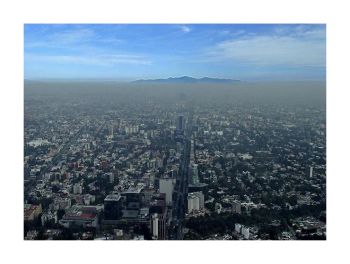
Decades ago Mexico City’s air pollution was so poor, birds would fall out of the sky — dead.
Locals said living there was like smoking two packs of cigarettes a day, according to one report. In response, Mexico City took several steps to try to improve air quality including restricting driving one or two days during the weekdays.
The program has had negligible results.
In 2008, the city added driving restrictions on Saturdays in hopes of moving the needle but according to new research by Lucas W. Davis, an associate professor at UC Berkeley’s Haas School of Business, extending the program one more day also isn’t working.
“Saturday driving restrictions are a flawed policy. It’s a big hassle for people and does not improve air quality,” says Davis, who is also the faculty director at the Energy Institute at Haas.
The study, “Saturday Driving Restrictions Fail to Improve Air Quality in Mexico City,” published in Scientific Reports, is the first to examine the effects of restricted driving on Saturdays. It compares pollution levels of eight major pollutants before and after the program went into effect. Having fewer motorists on the road on Saturdays led to close to zero impact. Proponents of the Saturday program had estimated vehicle emissions would be reduced by 15% or more.
Mexico City has the worst air quality in the Western Hemisphere with particulate levels that are three to four times higher than in New York, Los Angeles, São Paulo, or Buenos Aires, the paper states. Mexico City has tried many different approaches to improving air quality, including the city’s well known driving restrictions, which were first introduced in 1989.
The program works like this: restrictions are based on the last number of a vehicle’s license plate. For example, vehicles with license plates ending in “5” or “6” cannot be used on Mondays. The ban is in effect from 5:00 a.m. to 10:00 p.m. for both personal and commercial vehicles.
To determine the impact of Saturday restrictions, Davis analyzed hourly air pollution data from 29 monitoring stations around Mexico City from 2005 to 2012. He studied emission levels for carbon monoxide; nitric oxide; nitrogen dioxide; nitrogen oxide; ozone; large particulates; small particulates; and sulfur dioxide. None of these pollutants decreased as a result of Saturday driving restrictions.
Trying to figure out why pollution did not decrease, Davis next examined ridership data from Mexico City’s public transportation systems. From city buses, to light rail, to electric buses, he found no discernible increase in Saturday riders.
“People have found other ways to get around the driving restrictions,” says Davis. “Some purchase multiple cars, others takDavis argues that as Uber and other taxi-like services become increasingly available, driving restriction policies will continue to struggle to improve air quality. Instead, he suggests that Mexico City and other cities plagued by dangerous pollution need to require stricter vehicle emission tests.e taxis or Uber.”
“Test every car, test every year. If you have a car that’s polluting the air, you can’t drive it. Period,” says Davis.



